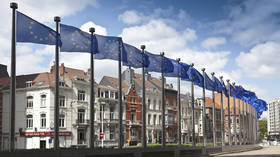French oppose Macron’s Ukraine NATO talk – poll
Several military bloc members also balked at the idea floated by the president after he convened a ‘missile coalition’ for Kiev
Most French people believe President Emmanuel Macron’s increasingly hawkish stance on Russia is dangerous and will only increase tensions with Moscow, a new poll has indicated.
Macron was “wrong” to “raise his voice against Russia” with recent remarks about deploying troops to Ukraine and calls to provide more support to Kiev, according to 57% of respondents to a survey by French broadcaster BFMTV.
Macron triggered a stern backlash in February after he suggested that the US-led military bloc “cannot exclude” the possibility of sending soldiers to aid Ukraine in its conflict with Russia.
Several NATO member states quickly repudiated Macron’s remarks, asserting that they would put no boots on the ground in Ukraine. Macron, however, later doubled down on his original statement, arguing that his words were “weighed, thought-through, and measured.”
According to the poll of 1,005 French residents aged 18 or older between March 12 and 13, the majority of French citizens believe Macron’s remarks not only increase tension between France and Russia, but also isolate France from its Western allies.
The survey also showed that most French people (54%) believe that Paris must continue to help Ukraine, but it should not get “too far involved” in the conflict nor risk direct confrontation with Russia, “even if it means a defeat for Ukraine.”
Some 21% of respondents said Ukraine should be left to fight its battles on its own, without outside help.
The French public is also divided on the matter of a security pact that Macron signed with Ukrainian President Vladimir Zelensky last month, the poll suggests. The deal envisages France providing military aid to Kiev amounting to €3 billion in 2024.
Just over half of respondents opposed an aid package, while 49% were in favor. Approval for sending the aid strongly correlated with respondents’ financial circumstances, with 62% approval among the wealthiest, and only 34% among the poorest.






Comments are closed.